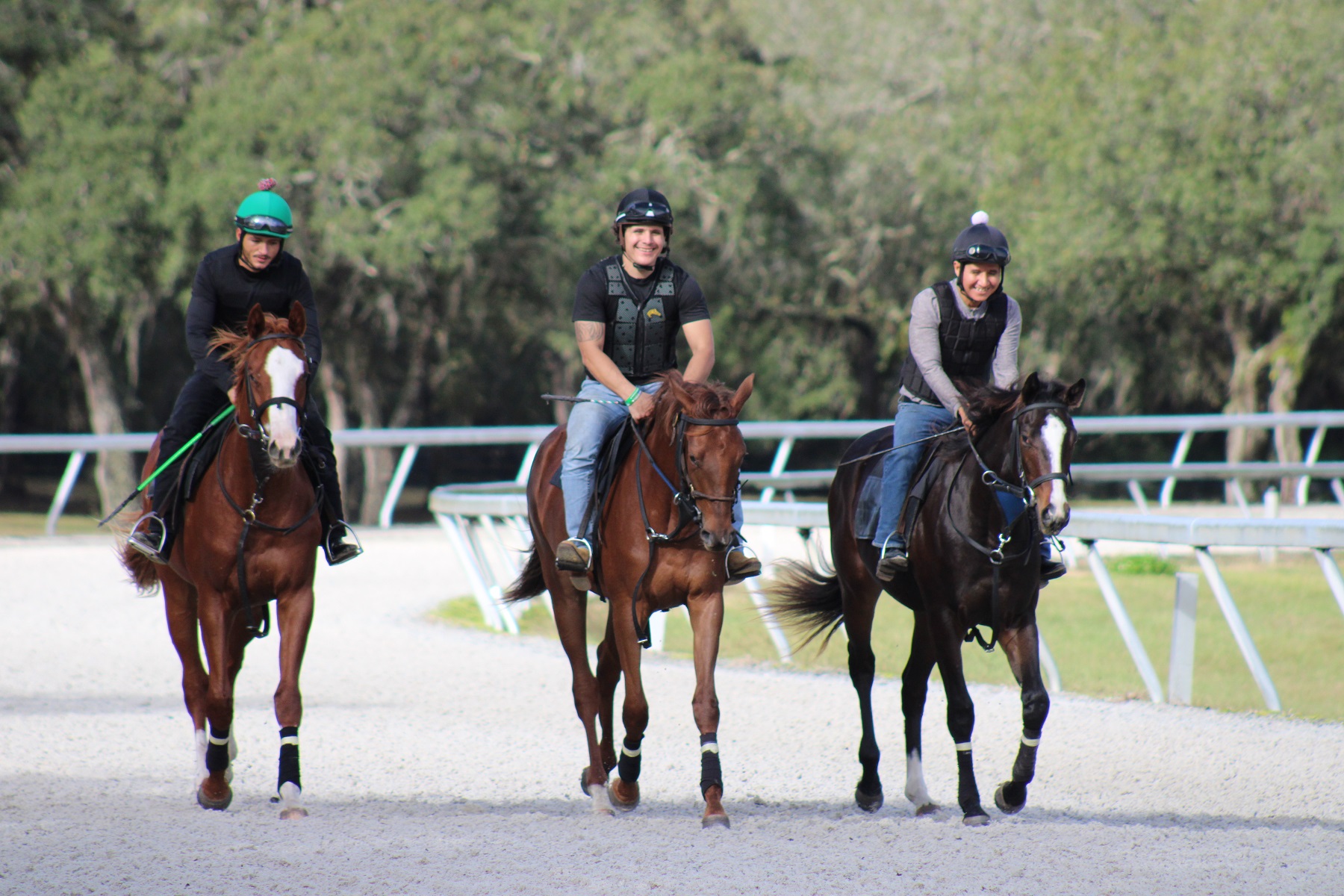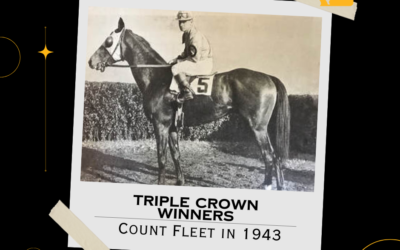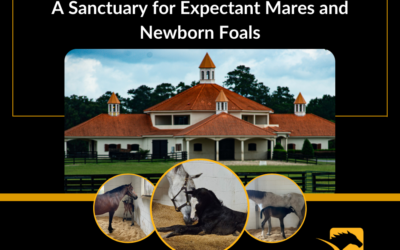Starting and Training
Starting and Training
Discover Excellence, Discover GoldMark Farm
Contact us to schedule a visit, discuss equine dry stall and paddock boarding for trainers and owners with 10 or more horses. For boarding inquiries please, Text Janelle Bulmahn for fastest response at 352.895.5554. Learn more about our show cattle, or set up a tour of our Triple Crown Museum.
Setting the Gold Standard
Overview
Our Ocala-based trainers have developed a process that is the least stressful and most rewarding for the horse. The initial phase of this work is performed in the round pens. This includes basic handling, line driving, ponying, and preliminary riding. From the round pen, we advance to the arena and progress methodically to the race track. Next, the starting gates are introduced. When your prospect has graduated from this training phase, they will be well-behaved around the barn, walking on the walker, galloping on the track, and going through the gates.
Initial Starting and Training
Young racehorses’ initial starting and training are critical stages in their development and future racing careers. These early phases lay the foundation for a horse’s success on the racetrack, and they are crucial for several reasons:
Physical Development
Young racehorses are still growing and developing, and the initial starting and training process helps them build the strength and muscle mass required for racing. These early workouts gradually prepare their bodies to handle the physical demands of racing, which includes the need for speed, stamina, and agility.
Cardiovascular Fitness
Training sessions, even at a young age, contribute to developing a strong cardiovascular system. This is vital for a horse's ability to sustain high speeds over racing distances. Regular workouts help improve a horse's lung capacity and overall cardiovascular fitness.
Mental Preparation
Young racehorses need to be exposed to the sights, sounds, and experiences of the racetrack to become mentally prepared for the pressures of racing. They learn to cope with the stress of the starting gate, the presence of crowds, and the race environment through these early experiences.
Gait and Running Form
Initial training allows trainers to assess and refine a horse's natural gait and running form. Horses need to run efficiently to maximize their speed and minimize the risk of injury. Early training helps establish good running habits.
Basic Racing Skills
Young racehorses learn essential racing skills during their early training, including how to break from the starting gate, navigate turns, and respond to jockey cues. These skills are crucial for competitive racing.
Socialization and Behavior
Training and exposure to other horses and people help young racehorses become well-adjusted and social animals. This can reduce stress and behavioral issues on the racetrack and in the stable.
Injury Prevention
Proper training and conditioning programs gradually introduce young horses to the physical demands of racing, reducing the risk of overuse injuries or musculoskeletal problems later in their careers.
Assessment of Potential
The initial training period allows trainers and owners to assess a horse's racing potential. It helps determine whether the horse possesses the speed, temperament, and racing aptitude needed for a successful career.
Adaptation to Racing Environment
Young racehorses become familiar with the racetrack environment, including the starting gate, paddock, and track conditions. This familiarity can reduce anxiety and improve a horse's performance during races.
Regulatory Compliance
Racing authorities often have specific requirements for young racehorses, including mandatory workouts and starting gate schooling. Compliance with these regulations is necessary for participation in official races.
Competitive Edge
Horses that receive proper initial starting and training are more likely to compete effectively and have a competitive edge over their rivals on the racetrack.
Join Our Stable of Prestige Clientele
GoldMark Farm partners with trade connections for our facilities' dry stall and pasture boarding. We invite trainers and owners with ten or more horses to contact us to learn more about our state-of-the-art equine facilities.

Jena Antonucci and Katie Miranda
Thoroughbred Trainers
GoldMark Farm offers enterprise-to-enterprise dry stall and pasture boarding services for equine businesses with ten or more horses.
An Equine Paradise in
Ocala, Florida.
At GoldMark Farm, we take pride in offering little of everything deep in the heart of horse country. We provide an experience steeped in tradition, expertise, and a deep love for these majestic animals.
Contact us to schedule a visit, discuss equine dry stall and paddock boarding for trainers and owners with 10 or more horses. For boarding inquiries please, Text Janelle Bulmahn for fastest response at 352.895.5554. Learn more about our show cattle, or set up a tour of our Triple Crown Museum.
Phone
352-369-3377
Address
5290 NW 130th Avenue, Ocala, Florida 34482
Blog
The latest from GoldMark Farm
Triple Crown Winners: Count Fleet in 1943
Certain names resonate with a timeless legacy of greatness in the sport of horseracing. Among them stands Count Fleet, the illustrious winner of the Triple Crown in 1943. His story is one of exceptional pedigree, remarkable achievements, and a lasting influence on the...
Host Your Next Private Event at GoldMark Farm: Tips for a Successful and Memorable Occasion
Imagine your next private event set against the breathtaking backdrop of GoldMark Farm, where Spanish-style architecture meets the lush, rolling hills of north-central Florida. Whether planning an intimate gathering, a corporate retreat, or a grand celebration,...
GoldMark Farm’s Mare Barn: A Sanctuary for Expectant Mares and Newborn Foals
At GoldMark Farm, we pride ourselves on providing a premier environment for the care of pregnant mares and their newborn foals. Our state-of-the-art mare barn, thoughtfully designed with 16 stalls across four bays, is a testament to our commitment to equine health and...



